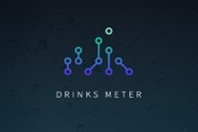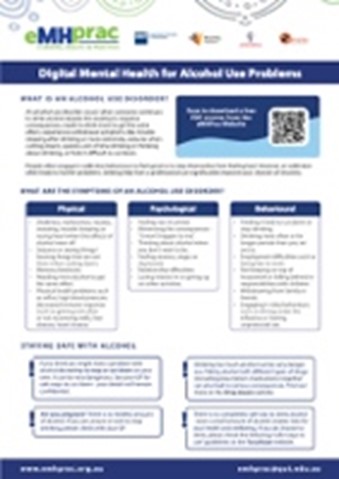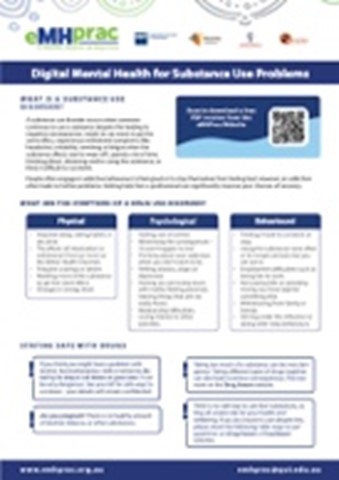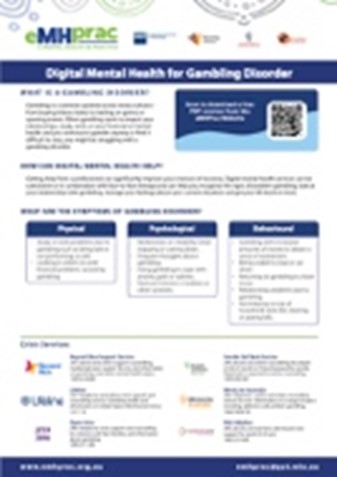Utilising Digital Mental Health Services for Addiction in Practice
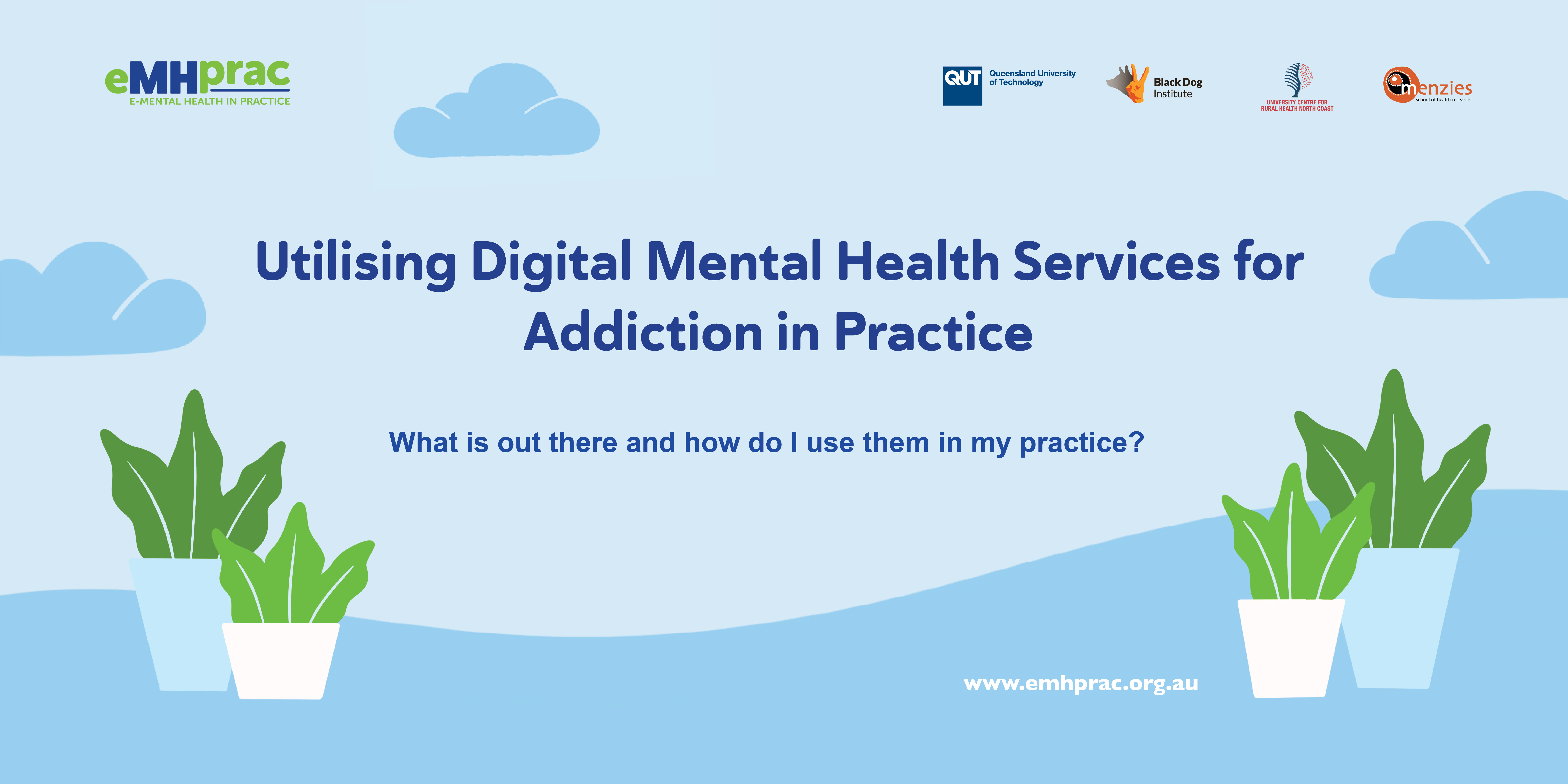
Utilising Digital Mental Health Services for Addiction in Practice
By Shelley Appleton, D.Psych(Clin), Clinical Psychologist, eMHPrac team
Digital interventions offer anonymity and ease of access for people struggling with addiction, potentially overcoming barriers to treatment engagement such as shame, cost, or transportation and legal issues (Priester et al., 2016). Digital mental health interventions such as information websites, phone services, apps, peer-support forums and online programs provide flexible options for people with a preference for working on issues on their own or can be integrated into standard care. However, a small sample of Australian psychologists reported being unsure where to find relevant, evidence-based, digital mental health programs and limited knowledge about how to integrate these resources into their practice (Scott et al., 2022).
eMHPrac (e-Mental Health in Practice) is a Government-funded service offering training and support in the use of digital mental health interventions to GPs, allied health professionals and service providers working with Aboriginal and Torres Strait Islander people. eMHPrac offers a variety of resources to help practitioners locate relevant, evidence-based, free or low-cost digital services, and learn how to use them in practice. The following guide highlights opportunities for integration of some popular digital resources into standard care addressing problem gambling, alcohol use and/or substance use.
Information Services
Digital information services can be delivered via any digital medium such as a website or mobile phone. Information services provide psychoeducation on topics such as harm minimisation strategies, risk and harm issues, individual tools and tips such as savings calculators, craving management strategies, online self-assessment tools, and brief intervention using motivational enhancement or CBT. Information services have been shown to improve mental health literacy of consumers and their caregivers, improve help-seeking, and reduce stigma (Brijnath et al., 2016).
Information services can be accessed by consumers contemplating treatment or can be integrated into standard care. These resources are safe to promote on service websites, in clinics or as a part of a discharge package. Information websites can be viewed in-session, as a homework task, or as a tool to assist with relapse prevention. Look for information websites that deliver evidence-based content and promote interactive learning and information phone lines that are staffed by trained workers.
Take a look at these examples:
|

|
|
|
|
|
Information to reduce the harm of alcohol and other drugs. |
Self-assessment and treatment information for people adversely affected by alcohol, drugs and gambling. |
Apps
Digital mental health apps vary widely in scope. Apps can contain in-the-moment craving management tools and self-monitoring, peer support communities, or even modular treatment programs to be completed over weeks or months.
It is especially important to investigate the evidence base of an app as there is a proliferation of mental health apps without any supporting research evidence. Some apps, particularly those measuring BAC, have been shown to actually increase alcohol consumption in users (Eisenstadt et al., 2021).
Try gauging whether a client would be willing and able to use a digital mental health app as part of their treatment toolbox. Try downloading an app with a client in session, engage the client in brief motivational interviewing around using the app and be sure to follow-up their progress and discuss barriers to use. Or use a practice iPad and take a client through the app in session.
Example evidence-based apps include:

|
|
|
|
|
|
A therapist-guided app for Indigenous clients with wellbeing concerns, chronic disease, or substance misuse issues. |
An app providing instant, unbiased, and anonymous feedback on your drinking.
|
Peer Support Platforms
Digital peer support platforms can be delivered via a website, an app or even video conferencing. Digital platforms have the benefit of allowing participants to be anonymous.
Peer support might provide a sense of normalising challenges, reducing shame, and highlighting problematic patterns that require addressing (Arguel et al., 2018). Quality studies have demonstrated a small effect size in reducing relapse when face-to-face peer support services are added to discharge care (Bassuk et al., 2016). Increasingly, services are integrating peer support options into any stage of treatment, rather than being exclusively for relapse prevention.
Here are some examples of digital peer-support platforms:
|
|
|
|
An app to help individuals change their relationship with alcohol, with professionals and community support. |
A website focused on harm reduction. Containing stories, drug information, and a 24-hour chat service moderated by peer educators. |
Phone/Video Services
Phone/video or webchat counselling with a trained facilitator differs from telehealth phone or video sessions with a therapist, in that they can be accessed as needed, and are often with a trained counsellor or peer-support worker instead of a mental health professional.
Phone, video and web-chat counselling services can be used for extra support outside of standard treatment settings, offer accessibility for consumers outside of business hours, act as an alternative for people unwilling or unable to engage in standard treatment, and to support people who are worried about addiction issues of a loved one.
Take a look at these phone counselling or web-chat services:
 |
|
|
Phone support for Aboriginal men for relationship issues, family violence, parenting, drug and alcohol issues or who are struggling to cope. |
Online chat (24/7), email support, online self-help modules, and moderated peer support forums for those affected by alcohol and other drugs.
|
Self-Guided or Therapist Supported Online Programs
Online programs are modular, self-paced treatment programs to be completed over weeks or months and can be self-guided, own-practitioner guided or guided by a service provider coach or therapist. Online treatment programs addressing alcohol and substance use issues (Newman et al., 2011) and gambling (Carlbring and Smit, 2008; LaBrie et al., 2012) improve primary outcomes with a small effect sizes maintained up to 6 months follow up. These programs are often based on CBT or motivational approaches (Giroux et al., 2017).
It has been speculated that users who complete self-help online programs might be more educated, maintain employment and have better reading, writing and computer skills (Giroux et al., 2017). However, clinicians can coach any consumer through an online program between treatment sessions, components of a program in session, or prescribe a program for relapse prevention.
|
|
|
|
Programs for people supporting someone using ice, or alcohol and/or other drugs. |
24hr phone, online and email counselling, SMS support, online self-help modules, and peer support forums for anyone affected by gambling. |
Digital Mental Health Service Directories
Are you looking for a different service? Evaluating whether a program is evidence-based and safe for consumers to use can be time-consuming. Fortunately, there are some sources that regularly update available digital mental services from trusted Australian service providers, and these are a great place to start:
 |

|
|
|
|
Or peruse eMHPrac’s factsheets on a range of topics:
|
|
|
|
|
|
|
To find out more comprehensive information about using a digital mental health service safely with your consumers, take a look at the National Safety and Quality Digital Mental Health Standards.
For more resources and training in digital mental health visit emhprac.org.au.
Author:
Shelley Appleton
D.Psych(Clin), Clinical Psychologist, eMHPrac team
Dr Shelley Appleton is a Senior Research Officer with the eMHPrac team and a registered clinical psychologist and clinical supervisor. Shelley is passionate about facilitating access to mental health treatments and promoting mental health literacy in the general population. Shelley has over 10 years of experience with the psychology research group where she has worked to evaluate apps, web programs, and phone interventions addressing mental health and substance use disorders. Shelley also enjoys maintaining her role in private practice with children, adolescents, and adults.
References
Arguel, A., Perez-Concha, O., Li, S. Y. W., & Lau, A. Y. S. (2018, Feb). Theoretical approaches of online social network interventions and implications for behavioral change: a systematic review. J Eval Clin Pract, 24(1), 212-221. https://doi.org/10.1111/jep.12655
Bassuk EL, Hanson J, Greene RN, Richard M, Laudet A. (2016). Peer-Delivered Recovery Support Services for Addictions in the United States: A Systematic Review. J Subst Abuse Treat. Apr;63:1-9. doi: 10.1016/j.jsat.2016.01.003. Epub 2016 Jan 13. PMID: 26882891.
Brijnath, B., Protheroe, J., Mahtani, K. R., & Antoniades, J. (2016, Jun 20). Do Web-based Mental Health Literacy Interventions Improve the Mental Health Literacy of Adult Consumers? Results From a Systematic Review. J Med Internet Res, 18(6), e165. https://doi.org/10.2196/jmir.5463
Carlbring, P., & Smit, F. (2008). Randomized trial of internet-delivered self-help with telephone support for pathological gamblers. Journal of Consulting and Clinical Psychology, 76(6), 1090–1094. https://doi.org/10.1037/a0013603
Eisenstadt, M., Liverpool, S., Infanti, E., Ciuvat, R. M., & Carlsson, C. (2021, 2021/11/8). Mobile Apps That Promote Emotion Regulation, Positive Mental Health, and Well-being in the General Population: Systematic Review and Meta-analysis. JMIR Ment Health, 8(11), e31170. https://doi.org/10.2196/31170
Giroux, I., Goulet, A., Mercier, J., Jacques, C., & Bouchard, S. (2017). Online and Mobile Interventions for Problem Gambling, Alcohol, and Drugs: A Systematic Review. Front Psychol, 8, 954. doi: 10.3389/fpsyg.2017.00954
LaBrie, R. A., Peller, A. J., LaPlante, D. A., Bernhard, B., Harper, A., Schrier, T., & Shaffer, H. J. (2012). A brief self-help toolkit intervention for gambling problems: A randomized multisite trial. American Journal of Orthopsychiatry, 82(2), 278–289. https://doi.org/10.1111/j.1939-0025.2012.01157.x
Newman M. G., Szkodny L. E., Llera S. J., Przeworski A. (2011). A review of technology-assisted self-help and minimal contact therapies for drug and alcohol abuse and smoking addiction: is human contact necessary for therapeutic efficacy? Clin. Psychol. Rev. 31, 178–186. 10.1016/j.cpr.2010.10.002
Priester M. A., Browne T., Iachini A., Clone S., DeHart D., Seay K. D. (2016). Treatment access barriers and disparities among individuals with co-occurring mental health and substance use disorders: an integrative literature review. J. Subst. Abuse Treat. 61, 47–59. 10.1016/j.jsat.2015.09.006
Scott, S., Knott, V., Finlay-Jones, A.L. et al. (2022). Australian psychologists experiences with digital mental health: A qualitative investigation. Journal of Technology in Behavioral Science. https://doi.org/10.1007/s41347-022-00271-5

